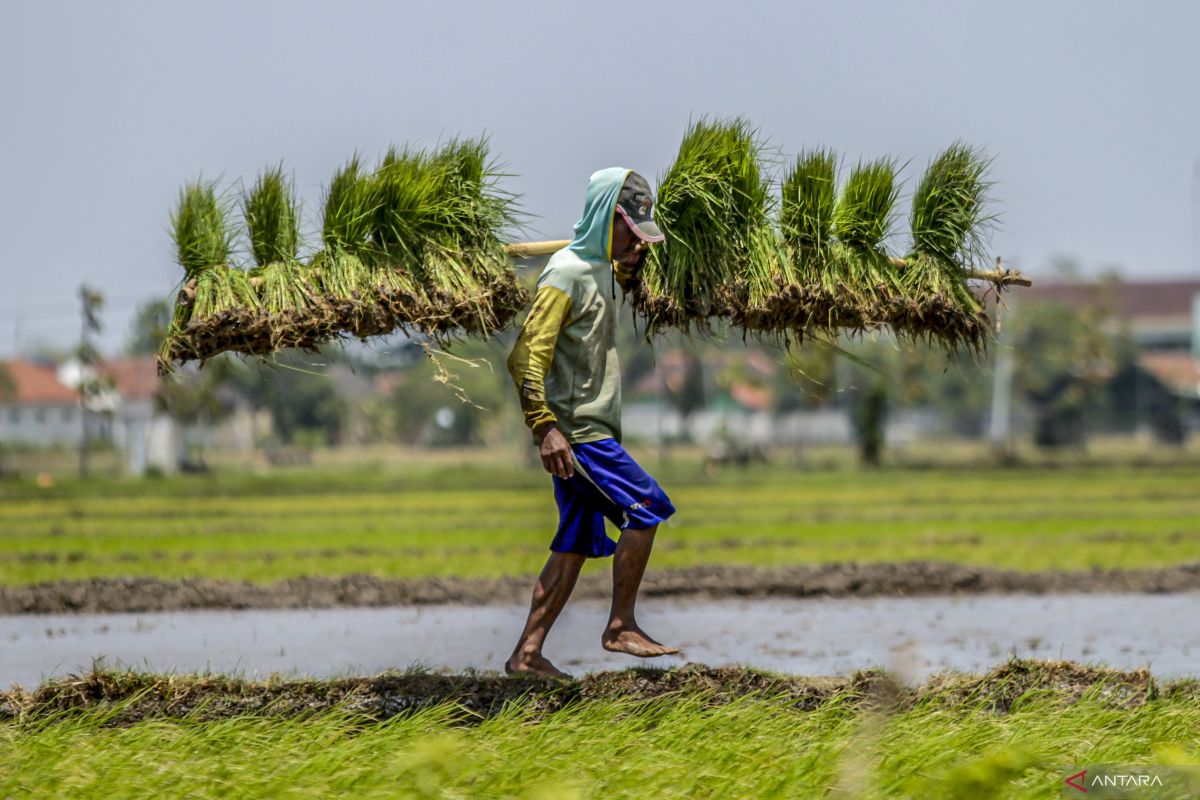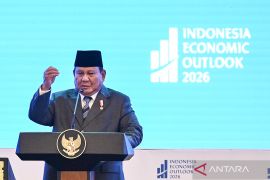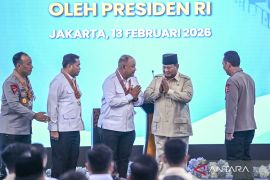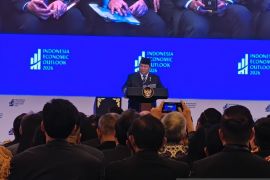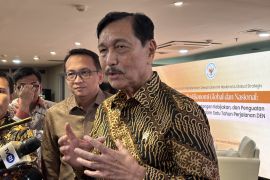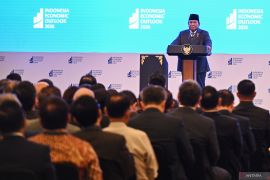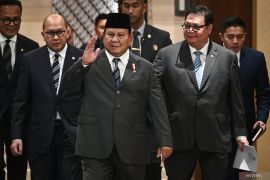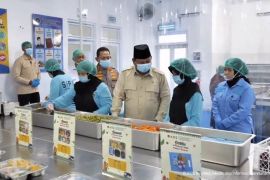Food security and self-sufficiency were among the topics highlighted by President Prabowo Subianto in his inaugural speech in Jakarta on Sunday (October 20, 2024).
Prabowo is aiming to build food self-sufficiency so that Indonesia does not need to rely on other countries to meet its people's food needs.
He said he believes that Indonesia can become food self-sufficient in four to five years.
He even expressed optimism that Indonesia is ready to become the world's food producer.
"We should not depend on sources of food from abroad. During a crisis, during an emergency, no one will allow us to buy their goods," he said in his speech.
Prabowo has even formed a new ministry, the Coordinating Ministry for Food Affairs, to support the goal. Zulkifli Hasan has been chosen to lead the ministry.
Prabowo has also appointed Muhamad Mardiono as the special presidential envoy for food security.
Among the Asta Cita programs planned for the next five years, President Prabowo and Vice President Gibran Rakabuming Raka have outlined several work programs for building food self-sufficiency.
They include continuing and improving the food production center area program or the food estate program in a sustainable manner, especially for rice, corn, cassava, soybeans, and sugar cane.
It is targeted that at least four million hectares of food crop harvest areas will be added by 2029.
The programs also include Agrarian Reform to improve farmers' welfare as well as support for increasing production in the agriculture, plantation, forestry, animal husbandry, fishery, and marine sectors.
The programs also comprise revitalizing and developing most of the damaged and unused forests into land for growing sugar palm, cassava, sweet potato, sago, sorghum, coconut, and other bioethanol raw materials using an intercropping system.
The programs further include raising agricultural productivity by increasing supporting facilities for smallholder farmers, integrated food technology, agricultural mechanization, digital farming, and improving the governance of agricultural value chains.
Food estate
Indonesia once declared it had achieved food self-sufficiency, especially in rice. However, in recent years, the country has had to import rice to meet the needs of its citizens or to maintain rice stock security.
The shortage has been caused by the conversion of agricultural land into industrial and residential areas and the declining interest among people in becoming farmers, among other things.
To maintain national food security, Indonesia continues to develop food estate projects.
During the era of 2nd president Soeharto, the government built a food estate project named the One Million Hectare Peatland Project in Kapuas district, Central Kalimantan, in 1995.
Under the 6th president Susilo Bambang Yudhoyono (SBY), the government developed the Merauke Integrated Food and Energy Estate (MIFEE) in 2010 by opening up 1.23 million hectares of land.
SBY also developed a food estate in 2011 in Bulungan, North Kalimantan, with the target of covering 30 thousand hectares of agricultural land. In addition, a food estate was established in Ketapang, West Kalimantan, with a total rice field area of 100 thousand hectares.
The food estate program was then continued in the era of the 7th president Joko Widodo. The food estate was made a strategic priority project through the issuance of Presidential Regulation Number 108 of 2022 on the Government Work Plan for 2023.
The program has since been implemented in seven regions, namely Banyuasin (South Sumatra), Belu (East Nusa Tenggara), Humbang Hasundutan (North Sumatra), Kapuas (Central Kalimantan), Merauke (South Papua), Pulau Pisang (Central Kalimantan), and Central Sumba (East Nusa Tenggara).
Those projects are targeted to increase national rice availability to 45.4 million tons, corn production to 34.12 million tons, and the production of starchy root vegetables to 25.2 million tons.
However, an agriculture observer from the Indonesian Political Economy Association (AEPI), Khudori, said that the food estate program, which has been carried out since the era of Soeharto's presidency, cannot be considered successful yet.
He then urged the government led by Prabowo to be more careful in continuing the food estate project to avoid previous failures.
It has been deemed essential for the government to create a thorough plan based on comprehensive studies of the land, climate, and socioeconomic conditions of the region.
The government must also pay attention to the environmental aspects and prevent damage to the ecosystem as well as be patient to reap the results.
Khudori pointed out that the results may not be obtained in just three to five years of the government's term.
"However, if done properly, it will lay a foundation for the next government, whoever the president is," he added.
Protecting farmland
In addition to food estates, which must be planned thoroughly, Khudori also highlighted the importance of the new government controlling the conversion of agricultural land to non-agricultural land by strengthening regulations that protect rice fields from conversion.
Indonesia has two laws in place that firmly regulate the protection of agricultural lands, namely Law Number 41 of 2009 on Agricultural Land Protection and Law Number 22 of 2019 on Sustainable Agricultural Cultivation System.
The two laws strictly limit the conversion of agricultural land, especially irrigated rice fields.
However, with the passage of the Job Creation Law, a number of regulations protecting agricultural land are considered to have been relaxed. This has raised fears that the rate of conversion of agricultural land to non-agricultural land would speed up further.
Indonesia's national rice production has tended to decline in the last five years. In addition to crop failure due to pest and disease attacks and natural disasters due to climate change, including the El Nino phenomenon, the decline in rice production has been prompted by shrinking agricultural land.
According to data from Statistics Indonesia (BPS), the national rice production declined from 31.42 million tons in 2018 to 31.31 million tons in 2019.
After reaching 31.36 million tons in 2020, rice production declined again to 31.33 million tons in 2021. It then rose to 31.54 million tons in 2022, but fell to 31.10 million tons in 2021.
Based on 2020 data from the Ministry of Agriculture, there was a reduction in rice field area from 8.09 million hectares in 2015 to 7.46 million hectares in 2019.
According to 2022 data from the Ministry of Agrarian Affairs and Spatial Planning, on average, around 100 thousand to 150 thousand hectares of rice fields are converted to non-rice field lands in Indonesia per year.
To tackle the challenges in food security that are becoming more complex, the government needs to have a strong commitment, supported by a clear vision and thorough planning.
The active collaboration of government, farmers, and private parties is also crucial for realizing the food security vision.
With its great natural resource potential, Indonesia not only has the capacity to achieve food self-sufficiency but also contribute to global food security.
Related news: Indonesia's new deputy minister emphasizes national food security
Related news: West Java should become national food barn: Intani chairperson
Editor: Rahmad Nasution
Copyright © ANTARA 2024
